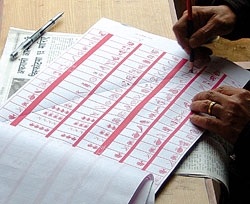| 
MARTY LOGAN
|
The declared municipal polls have proved to be a tough nut to crack for the king. He began his publicity stunt for the elections after throwing political leaders and workers behind bars. The government, in other words, has adopted the Musharraf style by curtailing basic rights like peaceful gatherings and protests. But the situation has changed. No old-fashioned and outdated mechanism is going to work. Time has opened the doors to a revolutionary coming of age. Forget about the king, even the parties cannot move ahead with their traditional styles and values. Neither their demand for an all-party government and reinstatement of the House of Representatives under the constitution's Article 128 nor the king's takeover based on Article 127 can be justified. Rather, the ongoing movement should demand a constituent assembly that would be used to create a people's republic. That should be its only agenda. The royal regime may try to create mistrust and a rift between the agitating parties, especially the UML and Nepali Congress so the parties need to be alert. Their litmus test will be whether their leadership is responsible toward the aspirations of the new generation within their organisations. There has to be an end to this repeated struggle over generations for fundamental freedom. The Maoists too should conduct intensive discussions among themselves and should be ready to make all needed sacrifices to establish a people's republic non-violently. Ten years ago, in order to chant republican slogans the Maoists had to take up guns and enter the jungle. Today, the same slogans are echoing right under the nose of the palace. Then there is the king, who has obliterated terms like 'dialogue' and 'agreement' from his vocabulary. So why should the parties talk, especially when they have been gaining ground? In fact, it is the king who should be discussing talks because he needs to ask the people for a space for himself. The people's first agreement on democracy was made in New Delhi in 1950. It gave King Tribhuban the throne. But, the power of Singha Darbar was handed over to the palace. The Delhi agreement also had a provision for drafting a new constitution through a constituent assembly. But, the idea was kept in deep freeze for eight years. Then King Tribhuban singled out Mohan Shumshere as a possible threat and proposed to then Home Minister BP Koirala that the army be kept answerable to the monarch. Ironically, Koirala agreed and we are paying the price for that mistake today. In 1990, when the people once again tried to remake the constitution, the king claimed that he was not a defeated monarch and had to have his rights. We must learn lessons from this history. We need to be determined that the present movement should demand a constituent assembly that would pave the way for a people's republic.

